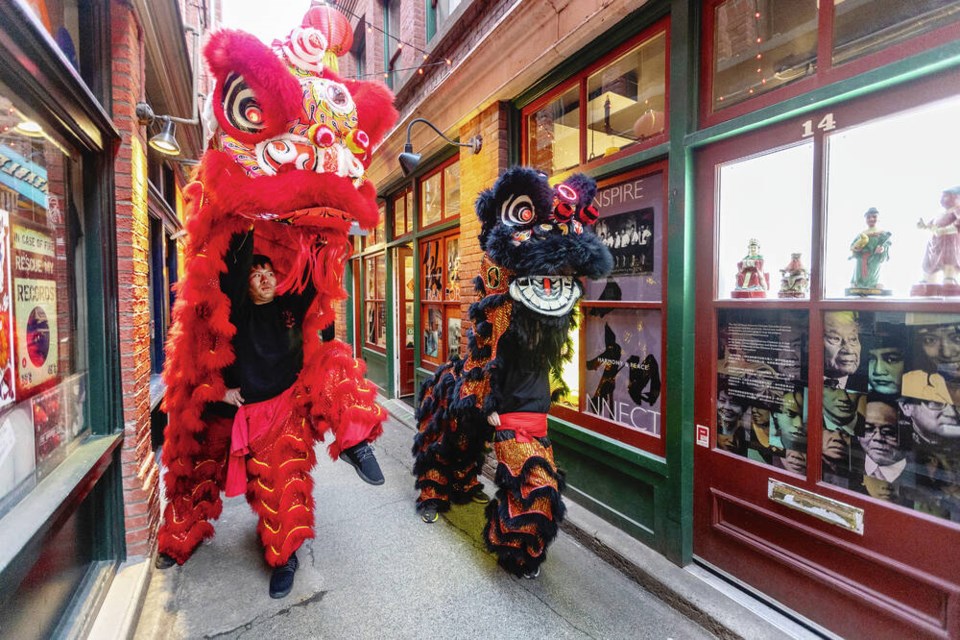You won’t find Annette Quan cleaning her house today. While not usually a superstitious person Quan, a third-generation Chinese-Canadian, still holds to the belief that cleaning one’s house on the first day of the Lunar New Year is akin to cleaning out good luck and prosperity.
While the 66-year-old, who was born in Victoria, doesn’t mark all the traditions around Lunar New Year, she still wants to pass some on to her two grandchildren, who are seven and 13.
“We still go to dim-sum together as a family and I still give them ‘lai see’ [lucky money] in red envelopes,” said Quan, a member of the Victoria Chinatown Lioness Club. “I think it is still important to do so, to remind them of their heritage.”
Growing up in what she believes was the only Asian family in Cordova Bay, Quan just tried to fit in with her white friends for many years.
“At that time, I didn’t want to be different. I didn’t want my parents speaking Chinese to me [in front of others],” she said.
Now she embraces the culture and traditions around the Lunar New Year. In China and most of the rest of Asia, it’s a national festival, with each of its 15 days celebrated with a theme or special tradition. In Victoria, it will be marked by a parade and celebrations around Chinatown next Sunday.
Although Quan still has a silk cheongsam — a traditional dress — she says it would be much too formal to greet guests and family.
“I will probably just wear a touch of red somewhere on my clothing,” said Quan.
You will also find red decorations throughout her house. The lettering on any banners will almost always be in gold and wishing luck and prosperity.
Families and friends who visit her over the festive season will invariably pull out ornate red envelopes whenever they see her grandchildren. The envelopes, known as lai see among Cantonese and hong bao among Mandarin speakers, are typically decorated with ornate Chinese calligraphy and symbols and filled with a nominal amount of money. The envelopes are only given to unmarried children and are meant to bring happiness and well-wishes to the recipient.
When they were in circulation, the Canadian $2 bill was a popular denomination as lai see, as it had a reddish hue. Families and individuals would go to the bank ahead of new year and try to get as many new bills as they could find to stuff into the envelopes.
Quan carried out a similar gift-giving tradition last week, bringing oranges as gifts to her co-workers on Wednesday. “Oranges represent gold,” she said. “The gift shows how much I respect my co-workers.”
Unlike the commonly used Gregorian calendar, the lunar calendar is based on the cycles of the moon and sun, which makes the date of the Lunar New Year different every year, although it always falls between Jan. 21 and Feb. 20. It typically coincides with a new moon, usually the second new moon after the winter solstice.
In many Asian countries, businesses and schools are closed — from one to two weeks — to allow workers to return home to celebrate the holiday with their families.
This year is the Year of the Rabbit, one of 12 animals in the Chinese zodiac, which also includes the Rat, Ox, Tiger, Dragon, Snake, Horse, Goat, Monkey, Rooster, Dog and Pig. Those born under those signs are believed to reflect the personality of the animal.
Quan said she was born in the Year of the Monkey. “And it’s kinda scary, as I share some of the characteristics attributed to a monkey,” she said with a laugh. “It’s like believing in horoscopes — there is good and bad sides to it. It’s just fun.”
People born in the Year of the Rabbit are seen as vigilant, witty and smart. It’s one of the most favoured Chinese astrological zodiac signs. Quick, with dexterous hands, rabbits are believed to do well in art and cooking. The best careers for someone born in the Year of the Rabbit include education, medicine, the judiciary and politics.
A parade in Victoria’s Chinatown next Sunday, on Jan. 29, sponsored by the Chinese Consolidated Benevolent Association, will kick off with a lion dance by the Wong Sheung Kung Fu Club, which has been teaching kung fu and lion dance since 1974. This year, the club will begin its largest performance of the year with a routine that features 10 lions — the most the club has ever attempted at once, said Daniel Low, the club’s most senior lion dancer, with 31 years of experience.
A second-generation Chinese-Canadian whose family has been in the restaurant business for years, Low said Lunar New Year is like “Easter, Thanksgiving and Christmas all rolled up into one.” “Our family generally eats for two weeks straight.”
Lion dances are performed to bring good fortune and chase away evil spirits. In Chinese culture, the lion symbolizes wisdom and power.
After the dances, two lions will parade their way through Chinatown, visiting merchants who hang an offering of leafy vegetable greens and lucky money for the lions.
The lion dance is intended to scare away evil spirits, bringing good luck and prosperity to the businesses.
Students from the Chinese Public School will also perform a dragon dance and other traditional Chinese dances.
The Jan. 29 event runs from noon to 3:30 p.m. and starts at the entrance to Chinatown, at the corner of Fisgard and Government streets.
For more information on the Wong Sheung Kung Fu Club, go to hungfut.ca.
>>> To comment on this article, write a letter to the editor: [email protected]



